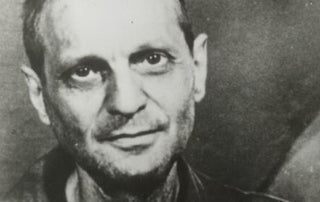One Christian hero who I am privileged to have met is Richard Wurmbrand. His story, told in Tortured for Christ, impacted me deeply as a young student.
Wurmbrand was born in 1909 in Bucharest, Romania, to a poor, non-practising Jewish family. In his teens he became a convinced Marxist and his Communist Party sent him to study in Moscow. Wurmbrand soon returned as a communist agent where he found himself frequently in trouble with the Romanian authorities.
In 1936, now married, Wurmbrand found himself troubled by the way his atheism brought him no peace. He and his wife encountered a carpenter with a Christian faith who shared the gospel with them and gave them a Bible. After reading it, and meeting other Jewish Christians, they came to faith in Christ. Wurmbrand now transferred his zeal from communism to Christ and began evangelising Romanian Jews. When the Second World War broke out, the Wurmbrands continued their active Christian witness under a brutal Nazi occupation and were involved in smuggling Jewish children out to safety.
In 1944 Romania was liberated from the Nazis only to become occupied by the Soviet Union. Wurmbrand continued ministering in Romania, pastoring a church of a thousand people, mostly Jewish converts. However, as an ex-communist, he felt driven to reach out to Red Army soldiers, most of whom were atheists. Between 1945 and 1947 he had a million Russian gospels printed and distributed to the occupying army.
As the communist grip on Romania tightened, the churches came under the control of the government. Many churches and pastors chose to either stay silent or support the government, but Wurmbrand courageously refused and began to work on creating an underground church answerable only to Christ. The underground church’s resistance to the state’s influence made it a target and in 1948 Wurmbrand was arrested. A dreadful eight-year period of imprisonment, brainwashing and torture began. Tortured for Christ, the account Wurmbrand later wrote of his sufferings, is a harrowing but powerful report of what happened both to him and the Romanian church in these dark years.
With his existence concealed by the authorities, Wurmbrand in effect disappeared from the world. His wife Sabina, who served three years in prison herself, was told her husband was dead. During this period Wurmbrand passed through a variety of prisons and spent three years in solitary confinement in a tiny cell. Somehow, despite repeated torture and being forced to observe the execution of other believers, he stayed sane and upheld his faith.
Wurmbrand was released in 1956 but, despite warnings, immediately continued with open evangelism. He was arrested again in 1959 and sentenced to 25 years imprisonment. New abuse and suffering began. By the 1960s the plight of Christians in Eastern Europe became well known in the West and pressure was applied for the persecution to stop. In 1964 a frail Wurmbrand was released under amnesty. Then, after a payment of $10,000 to the Romanian state by Norwegian Christians, and after Wurmbrand was convinced by fellow church leaders that he could best serve the church as a spokesman abroad, Richard and Sabina were allowed to leave Romania.
Liberated, Wurmbrand began travelling in the West. As an excellent linguist and a passionate and gifted speaker, he made effective appeals for the persecuted churches in Eastern Europe. His horrific scars made his testimony particularly convincing. Soon the public face of the persecuted church, Wurmbrand formed an interdenominational organisation to support persecuted Christian believers, first in communist countries but later in the Muslim world.
Wurmbrand’s powerful testimony was greatly aided by his compelling books. Tortured for Christ, published in 1967, became a bestseller and was translated into 80 languages. In 1989 communism in Eastern Europe collapsed and in the following year the Wurmbrands were able to return to Romania. Wurmbrand’s campaigning continued for oppressed Christians everywhere. He died in 2001, just months after his wife.
Richard Wurmbrand is an extraordinary hero whose testimony of suffering ranks alongside any in church history. Four aspects of his life challenge me.
First, Wurmbrand showed an earnest faith. He took his faith in Christ with a profound seriousness. It was more important than life or death to him.
Second, Wurmbrand showed an enduring faith. Many Christians could probably handle brief attacks for their beliefs but Wurmbrand faced appalling hostility and brutality over years. Throughout his life he showed a humbling ability to show love to his persecutors.
Third, Wurmbrand had an evangelistic faith. When Christians come under pressure, the first thing to suffer is often their outreach. Richard Wurmbrand refused to believe that silent Christians will be spared; he never stopped fearlessly and openly witnessing to Jesus.
Finally, Wurmbrand had an effective faith. He played a remarkably important role in keeping the Romanian church alive. His extraordinary testimony to the sufferings that Christians were enduring in Eastern Europe helped build pressure on communist systems. In fact, his witness is considered to have been a factor in the ultimate collapse of communism in Romania and elsewhere. Very few Christians can claim responsibility for the downfall of a political system but Wurmbrand was one such man. But, of course, he had earned that privilege.
So associated with communism is the name of Richard Wurmbrand that it’s tempting to consider that he was part of an old battle that is long won. The sad truth, however, is that, this side of Christ’s return, evil simply returns from a defeat in a new form. Richard Wurmbrand reminds us that we must stand firm for Christ and against evil in whatever form. And at whatever cost.
J.John
Reverend Canon




